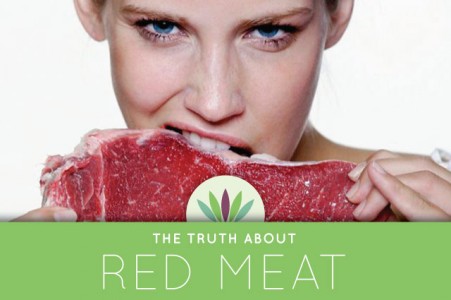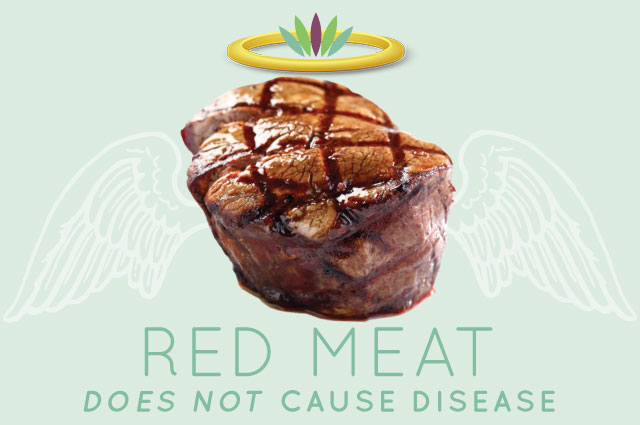Grass fed red meat does not cause disease! I do believe that conventional red meat and processed red meat, the meat that 95% of the country consumes can contribute to disease. It’s full of nasty stuff. High protein diets in general are not good for health either. You need just the right amount. Don’t take my word for it. Let’s delve in and see what the latest well done research is speculating about red meat.
Does Red Meat Cause Disease?
There is significant controversy about the health effects of consuming red meat. Part of this is due to the fact that studies show that red meat is not a uniform product but rather seems to vary significantly in health effects based on fat content, processing and preparation. Many studies do not differentiate between grass fed, conventionally raised meat, fresh red meat and processed red meat. These all have different effects on health. Recently, a few studies have come to light proving that fresh red meat is healthful, while the problem lies in processed red meat – the culprit in contributing to disease.
When unhealthy lifestyle factors have been accounted for, most studies find that consuming moderate amounts of red meat have beneficial health effects due to its nutrient content. (15) You can read more about this in my article on red meat, Is Red Meat a Superfood? Red meat contains large amounts of iron, creatine, and is mineral-rich in zinc and phosphorus and others. It is also rich in B-vitamins, especially vital vitamin B12, not found in large amounts in other meats. Red meat is also the richest source of lipoic acid, a powerful antioxidant that is needed to detox the body of toxic heavy metals. It’s very healthy stuff!
One of the only studies to date showing a correlation between eating grass-fed red meat and robust health is a recent study published in the journal Cancer Causes and Control. This study examined cancer rates among the Amish, which are 44 percent lower than the national rate. They are far healthier than most Americans and they eat red meat! But they eat only grass fed red meat. An important factor not specifically examined in the study is the fact that the Amish grow and raise all their own food. They employ organic farming methods that provide them with healthy fruits, vegetables, milk, grass fed meat, and other untainted foods. Amish food is grown and raised the way it should be, including their grass fed meat, resulting in improved health and lower disease rates. (18)
Processed Red Meat Causes Disease
Processed red meat is absolutely correlated with increased risk of disease and should be avoided. Recent studies, such as a 2010 Harvard University study covering over one million people, have studied the effect of fresh (unprocessed) versus processed red meat and found processed meat to have significant health risks. (4) In 2011, the American Institute for Cancer Research suggested that you should reduce consumption of cooked red meat to less than 18 ounces (28g) per week (many others think more can be safely eaten) and avoid processed or packaged meats to reduce cancer risk. (1) Translation? Eat fresh red meat at least once a week.
One notable study, the EPIC (European Prospective Investigation into Cancer and Nutrition) study involved ten countries in Europe and almost half a million people. A person’s risk of premature death from all causes increased with the amount of processed meat eaten. This is also true after correcting for confounding variables like smoking and drinking, although residual confounding variables (other unhealthy lifestyle factors) cannot be excluded. The study found that a small amount of red meat appeared to be beneficial, which the researchers suggest is because meat is an important and rich source of nutrients and vitamins. (15)
Red Meats to Avoid
You want to avoid processed meats that were made in large factories versus fine processed meats made on a very small scale. Some of these meat products are of very high quality meat (grass fed organic), do not use harmful preservatives and are made with fresh meat. The key to health is to avoid any products made with low quality meat, synthetic nitrites (sodium nitrite) and MSG (monosodium glutamate), a neurotoxin used to add flavor. Avoid these processed meats (or enjoy rarely) that are positively correlated with disease:
- Beef jerky (unless homemade or a high end product made naturally)
- Bacon (unless grass fed, organic and from a high end producer like US Wellness Meats)
 Sausage (unless it is freshly made with grass fed organic meats at a high end restaurant or purveyor of fine foods without preservatives and MSG)
Sausage (unless it is freshly made with grass fed organic meats at a high end restaurant or purveyor of fine foods without preservatives and MSG)- Hot dogs (unless made with grass fed organic meats or made from a purveyor of fine foods without preservatives and MSG)
- Ham (mostly salt and water)
- Sandwich meat (Fine Spanish prosciutto: ok, Oscar Mayer bologna: Avoid)
- Frozen pizza with meat
- Canned soups with meat
- Frozen meals with meat
- Ravioli and meat pasta foods
- Kid’s meals containing red meat
- Sandwich meat used at popular restaurants (think Subway or any chain restaurant)
- Nearly all red meats sold at public schools, restaurants, hospitals, hotels and theme parks
Does Red Meat Cause High Cholesterol and Heart Disease?
Despite claims by the media and medical establishment to the contrary, Steve Guyenet does a fine job of showing that there’s no consistent evidence demonstrating that the saturated fat found in red meat significantly raises cholesterol levels. (3) What many studies mistakenly conclude, especially when they are short term (weeks or a few months), is that saturated fat increases cholesterol. This is true, but only in the short term, say, after a meal. Saturated fat consumption does not increase cholesterol over the long term. Eating grains and refined sugars causes high cholesterol.
One large meta-analysis study (a study reviewing many other studies) involving almost 350,000 participants have found no association between saturated fat intake and cardiovascular disease (17). The solid data I’ve mentioned do not suggest a strong relationship between red meat and heart disease. Including red meat in your diet will not give you a heart attack, much less an early death.
Be warned. About 15% of the population carries a gene that keeps cholesterol in their blood. For this group, dietary cholesterol can cause high cholesterol. This served a purpose to keep a person healthy in times of famine, but today in our feast-worthy society, it clearly is causing problems. As with any diet. monitor your health to see if the Modern Paleo diet, or any diet for that matter, works for you.
Does Eating Meat Shorten your Life?
Do vegetarians live longer than carnivores? Many early, poorly done studies show that vegetarians live longer than meat eaters. This incorrect finding convinced me to go vegetarian, which I did for two years, because I want to live a long time! Lierre Keith (whom I had the honor of interviewing on the Live to 110 Podcast), in her brilliant book, The Vegetarian Myth, says that census records prove that vegetarians do not live longer than meat eaters, no matter what research says. (7) But let’s look at the research anyways.
If eating meat increases heart disease risk, as is commonly believed in the medical community, we might expect lower rates in vegans and vegetarians. Early studies suggested this was true, but later, better-controlled studies suggest it’s not. Most early studies were poorly designed and subject to confounding factors. Vegetarians tend to be more health conscious on average than the general population, so there could be other factors explaining their longevity, such as more exercise, less smoking, etc.
This evidence also highlights the fact that any health issues associated with meat eating may not come from the meat per se, but a relative absence of other healthier foods. For example, in this study, vegetarians generally ate more vegetables, fruits and nuts. In fact, this study found evidence that the apparent health benefits of vegetarianism were tied not so much to the absence of meat, but to an increased consumption of healthier foods overall. (2)
Newer, higher quality studies that have attempted to control for these confounding diet and lifestyle factors haven’t found any survival advantage in becoming vegetarian. For example, one study compared the mortality of people who shopped in health food stores (both vegetarians and omnivores) to people in the general population. They found that both vegetarians and omnivores in the health food store group lived longer than people in the general population. (8) This suggests that eating meat as part of a healthy diet does not have the same effect as eating meat as a part of an unhealthy diet. These same findings were confirmed in a very large study performed in the U.K. in 2003 with 65,000 subjects. This study did not observe a difference in mortality between vegetarians and omnivores. (10)
Many vegetarian books and websites cite studies on Seventh-day Adventists, many of whom are vegetarian. These major studies found vegetarians to be at lower risk of death compared to non-vegetarians. However, many other studies do not. And, actually, when all the results were put together, vegetarianism does not confer any benefit in terms of overall risk of death. (10) In other words, the overall result in reviewing all the research runs counter to the idea that vegetarianism is linked with improved longevity.
Problems in Red Meat Research
Most research about red meat claims that red meat is bad for you and causes disease. It’s a bit difficult for most people hearing about these studies in the news to discount all this research. There seems to be so much evidence for this commonly held belief. You have to understand that it takes about 10-15 years for the latest research to become generally accepted in the population and even the medical field. This is why most people think that red meat is bad for you – they are basing their ideas on outdated research findings.
In my findings, most red meat research tells us a lot more about the biases and motives of the researchers, and the incompetence of the media reporting on it, than it does about the effect of red meat consumption on human health. Red meat scares have been breaking out for decades due to many different reasons:
- Healthy User Bias. This bias is evident in the fact that people that eat meat typically have less healthy lifestyles than more health conscious white meat eaters or vegetarians (who think they are eating healthier). This bias makes it seem as if meat is causing health issues and disease.
- Toxic Meat Bias. All research is done with unhealthy conventional meat full of hormones, antibiotics, and GMO grain feed.
- Epidemiological Studies. Many studies on red meat are epidemiological in nature that are only able to draw correlations between red meat and disease – not causation.
- Poorly Designed Studies. Red Meat studies using food questionnaires are notoriously poor methods of data collection. Any results concluded from these studies cannot be relied upon.
- Author Bias. This can skew the results in whatever direction the author or researchers prefer.
- Incorrect Conclusions. Many studies produce conclusions that cannot correctly be drawn from their data.
- Claimed Effect is Small. Statistically small effects cannot be generalized to the population. I find it funny when newspapers splash headlines about the latest study vilifying red meat, when statistically, the study’s results are almost irrelevant. But those headlines sell newspapers!
The Healthy User Bias
One of the biggest problems with observational studies on red meat is what’s referred to as the “healthy user bias”. Since red meat has been vilified for years in the media, people who eat less of it tend to be more health conscious in general. People who don’t eat red meat in general tend to eat more healthy foods, like fruits and vegetables, and less of other foods that are actually unhealthy. They eat less of these foods that are proven without a doubt to cause disease:
 Refined sugar
Refined sugar- Trans-fats
- Wheat
- Processed foods
- Vegetable oils
They also engage in healthier lifestyle choices:
- They are more physically active
- They weigh less
- They eat less food
- They take more supplements
- They don’t smoke
- They don’t drink alcohol or consume very little
- They also tend to be more educated
This contributes to an increase in overall health and makes meat eaters in the studies look like they’re on their deathbed. They are, but not because they are eating meat! Their lifestyle and other dietary choices are unhealthy and proven to contribute to disease. Many who read the results of these studies take away the shallow conclusion that consumption of meat causes heart disease and an early grave. Conclusions like this cannot be drawn from most studies on red meat comparing them to white meat eaters and vegetarians.
Even in newer studies that attempt to control for the healthy user bias are rife with problems in their conclusions. In recent studies, authors have attempted to ‘control’ (take into account) for confounding factors like smoking and drinking. However, it’s well known that this is an imprecise science, and there’s always the potential for ‘residual confounding’ – confounding factors that were not addressed or not adequately controlled for that affect the results of the study. These studies only prove that vegetarians tend to lead healthier lifestyles than the majority of the population that eats meat.
Toxic Meat Bias
The biggest problem with all the studies done to date is the fact that they are barking up the wrong cow. They all look at conventional meat and its effects on health. I personally think that conventional meat is very unhealthy and can lead to disease. I like to call this problem in red meat research the ‘Toxic Meat Bias.’
Conventionally grown factory-farmed meat is full of genetically modified grain feed, growth hormones, pesticides, antibiotics and diseased animals. This witch’s brew is likely to make a lot of people sick if consumed on a daily basis over decades. Factory farmed meat is raised in horrifying conditions called CAFO’s (confined animal feed operations) and must be routinely fed antibiotics to prevent illness and infections. These animals are fed growth hormones to make them grow faster, reducing nutritional quality. They are also fed cheap GMO grains full of pesticides. Let’s not even get into the discussion about how GMO’s greatly impact the animal’s – and your – health. This diet makes the animals very ill, to the point where many cows have cancer (and other illnesses) and are near death by the time they are slaughtered. This does not create the picture of healthy food in my mind.
We need to be eating grass fed, organic meat like our ancestors ate, which is far, far more nutritious, absent of the above toxic ingredients and is even biochemically different than conventional meat. Cows and other ruminants like sheep and goats eat grass. This is the only diet that will produce healthy animals and healthy nutrient-rich meat that provides the proper nutrition and fat profile (more omega 3’s) that humans require. Hopefully, there will be more studies in the future using healthier grass fed meats.
Epidemiological Research
Most studies about diet and red meat intake are epidemiological, observational studies. Epidemiology is the study of the patterns, causes, and effects of health and disease conditions in defined populations. They look at what people are eating of their own choosing, follow them for a few decades, and look at how many people contract a given disease or die. According to the scientific method, this qualifies as an observation.
Epidemiological studies about meat intake usually tell us less about the risk or benefit of eating meat and more about people’s propensity to lie or to not recall exactly how much hamburger they ate. Bottom line: these studies can only conclude that there is a correlation between eating red meat and heart disease or early death. No study of this kind can confirm that red meat causes heart disease and early death.
The scientific method goes like this: we make observations, we come up with ideas to explain them called hypotheses, we perform experiments to test predictions generated from those hypotheses, we make conclusions based on the experiments about whether our ideas are correct, and then if other people can replicate those experiments, more and more people will begin to accept our conclusions. However, when the media report a brand new study, which has not been replicated, this misleads consumers into thinking that studies merely correlating red meat to disease are the final word in health. It’s just not the case.
Study Author Bias
There is something you must know about meat research. I love how Chris Kresser puts it, “Much of it is worthless propaganda parading as medical research brought to you by the tyrannical meat-hating scientific majority.” There is a well known phenomenon that goes on in the scientific community, most of which vilifies red meat because this is what has been done for so long.
If you are a scientist and you attempt to debunk the status quo – the commonly held belief that red meat causes disease – you will be ridiculed by your peers and may not receive funding for your studies. And if you don’t receive funding, then you can’t do research. Many scientists are forced to go with the status quo in order to continue their research. Humans are slow to accept and adopt new ideas – and this tenet is especially true for the research and medical community.
Another big problem in research is that study authors can easily bias the results substantially in whatever direction they prefer. Many times, results are quietly swept under the rug because the establishment didn’t like their results. They can also omit things they don’t like or don’t support their hypothesis. Or selectively cite studies in their conclusions that support their view.
For instance, the authors of a recent study in the Archives of Internal Medicine called Red Meat Consumption and Mortality have a few biases. (14) Interestingly, the authors of the study do not even mention the possibility of residual confounding (diet and lifestyle factors not taken into account), which seems like quite an omission to me. It smacks of a bit of bias. Might the authors have been committed to finding a link between red meat and worse health outcomes, and were perhaps disinclined to let anything get in the way of that finding and the message that we should be eating less meat? Is there any other evidence for bias in this review? I believe there is.
In the comment section of the review the authors refer to “Several studies [that] have suggested that vegetarians have greater longevity compared to nonvegetarians”, though they admit this might not be ascribed to the absence of red meat alone.” The studies which the authors refer to both date from 1999. One was a review of evidence in Seventh-day Adventists (2), while the other is an analysis of 5 separate studies (9). There is considerable doubt about how appropriate it is to generalize the findings of Seventh-day Adventists to the general population, on the basis that their lifestyle habits tend to be quite different from the general population (e.g. low rates of smoking, low intakes of meat and alcohol).
In referring to evidence seemingly supporting vegetarianism, the authors of this study’s review appear to have been extremely selective in studies they used to support their views, but actually cited evidence which does not support their view – that vegetarians live longer than meat eaters! This smacks of bias. This happens frequently in studies on red meat.
Study Conclusions That Cannot be Drawn from Their Data
One excellent example of conclusions that cannot be drawn from a study’s data is The China Study. The author, T. Colin Campbell, claims that eating meat and dairy will cause all the diseases of Western affluence – heart disease, stoke, dementia, you name it. Yet, the study overlooked many populations that eat high animal protein diets and have very low disease rates. This data was excluded from the study results. Dr. Campbell has even gone on to say that any complete protein, even from plants, can cause disease! And that plant fats do, in fact, cause disease. He’s really all over the place. With all these differing conclusions are we expected to fast since all foods cause disease?
There are many, many other flaws in the China Study as well. You can read all about them here on Dr. Chris Masterjohn’s meticulously written critique on the China Study. Most scientists, unless they are of the vegan bent, have debunked the China Study as being poor research and full of flaws and misleading conclusions, many of which are not in the nutrition field and simply looking at it from a sound research perspective. If you have changed your diet based on this study, you may have made a grave mistake with your health. Colin Campbell’s conclusions that meat and dairy kill simply cannot be drawn from the raw China Study data.
NIH Study
 Let’s pick apart one study on red meat as an example. A widely reported study conducted by the National Institutes of Health, published in the American Medical Association’s Archives of Internal Medicine, found that among over a half million followed from 1995 to 2005, those who reported eating the most meat were more likely to die than those who reported eating the least meat.
Let’s pick apart one study on red meat as an example. A widely reported study conducted by the National Institutes of Health, published in the American Medical Association’s Archives of Internal Medicine, found that among over a half million followed from 1995 to 2005, those who reported eating the most meat were more likely to die than those who reported eating the least meat.
What the NIH study actually found was a correlation between increased rates of death and a population’s propensity to report eating meat, not a correlation between mortality and true meat intake. Many studies you see claiming meat is bad for you have this same problem. They use intermittent questionnaires to determine what participants are eating. I don’t know about you, but I can barely remember what I ate two days ago. Consider what the researchers who validated the Nurses’ Health Study Food Questionnaire had to say:
Focusing on the second questionnaire, we found that butter, whole milk, eggs, processed meat, and cold breakfast cereal were underestimated by 10 to 30% on the questionnaire. In contrast, a number of fruits and vegetables, yoghurt and fish were overestimated by at least 50%. These findings for specific foods suggest that participants over-reported consumption of foods often considered desirable or healthy, such as fruit and vegetables, and underestimated foods considered less desirable. . . . This general tendency to over-report socially desirable foods, whether conscious or unconscious, will probably be difficult to eliminate by an alteration of questionnaire design.
People don’t like to admit they ate unhealthy food. I don’t blame them. I don’t like to admit that I sneak McDonald’s french fries here and there, but it’s true! So relieved to get that off my chest.
And then there’s the problem where meat eaters tend to not be as health conscious as people who don’t eat meat – that pesky healthy user bias I mentioned before. The NIH study found that people who reported eating more red meat were more likely to be married, to be white, to smoke, to eat more food in general, to weigh more, to be less educated, to take vitamin supplements less often, to eat fewer fruits and vegetables, and to exercise much less often. The portion of people who exercised and reported high intakes of red meat was only 16 percent! These factors are invariably going to tip the scales in favor of people who eat less red meat or avoid it completely.
Researchers call these confounding variables and use statistical methods to try to control for them. But there are always other confounders that the researchers don’t or cannot consider (there can be too many to take into account). This is why we never, ever use epidemiological studies like the NIH study that uncover correlations to demonstrate causation.
I love Chris Masterjohn’s take on some of the findings in the NIH study:
To illustrate the pitfalls of confusing correlation with causation, let us consider this: the study found a 26 percent increase in the risk of “mortality from injuries and sudden deaths” among those who reported eating the most red meat. It is entirely possible that eating red meat could increase the risk of injury, but is it probable? Not very. So the news reports and editorials have largely ignored this finding in favor of the increase in heart disease and cancer risk it found, because it seems intuitively more reasonable to most people that eating meat could cause these diseases.
The strongest correlation, however, was between eating red meat and the risk of “all other deaths,” which included death from tuberculosis, HIV, other infectious and parasitic diseases, septicemia, diabetes, Alzheimer disease, stomach and duodenal ulcers, pneumonia and influenza, chronic obstructive pulmonary disease and related conditions, chronic liver disease and cirrhosis, nephritis, nephrotic syndrome and nephrosis, congenital anomalies, certain conditions originating from the perinatal period, ill-defined conditions, and unknown causes of death.
Oh, yeah, and there’s one other little problem. The authors of the NIH study found that reporting a high intake of white meat was associated with a lower risk from almost all of these deaths! But the chemical constituents of red meat that the authors of this paper blame for causing disease — carcinogens formed during high-temperature cooking and saturated fat — are also found in white meat. I give up!
The Final Word
I’d like to see a study where the subjects are controlled for smoking, alcohol consumption and other unhealthy disease-inducing lifestyle habits, with one group fed grass fed, organic meat, another group fed conventional meat, and a control group eating no meat. Let the cards fall where they may. I’ll put my bet on the grass fed group for overall health and less disease. Put that in your pan and fry it. This would be a groundbreaking study. Oh, but then there’s that pesky funding issue. Who’s going to pay for that, the grass fed meat industry? Why would they do that? Their meat is flying off the farms faster than they can say Paleo. I’m hoping to see a study like this one day. However, I am told it’s never going to happen because it would be too expensive.
You can get too much of a good thing. You should eat no more than one-half to one pound (.22-.45 kg) per day of meat to meet your nutritional needs. This should include fresh red meat at least once a week. This level of meat consumption will provide healthful and nourishing amounts of protein, choline, carnitine and other nutrients and will not cause any harm if accompanied by healthy levels of plant foods (about 3 pounds or 1.35 kg per day). Any more animal protein than this can lead to health problems and reduce life span according to Dr. Paul Jaminet, author of Perfect Health Diet. (5) Some in the Paleo community recommend more protein. You ultimately have to find the amount of protein that works for your individual needs and goals. Enjoy that meat on a stick tonight!










